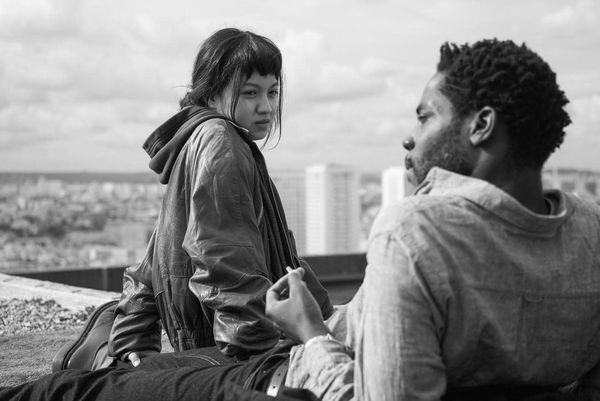 |
| Makita Samba and Lucie Zhang in Jacques Audiard’s Paris, 13th District. Jacques Audiard: 'To talk about love and sex during the lockdown is so important' Photo: UniFrance |
“My previous film had been a long shoot and was really tiring. That is why I wanted the new one to be quick. There was also the pandemic to contend with. Again that was a reason we shot fast so that we would not have long periods of exposure to the virus,” says Audiard, 69, who had a conflicted relationship with his late father Michel Audiard, who wrote over 100 screenplays.
He once told me: “My father never considered cinema as an art; for him, it was not something that could ever be confused with literature or music. I think cinema is very important. Needless to say, it was a subject of conflict between us."
An adaptation of stories by American comic book writer and artist Adrian Tomine, it was shot in the French capital during the pandemic, and predominantly in black-and-white. It follows Emilie, Camille, Nora and Amber — four young adults who are friends and sometimes lovers.
Audiard suggests that The Sisters Brothers was the opposite of Paris, 13th District as that film was dominated by men. Noted Audiard of the current movie: “It’s with women, with no violence, with love. It seems silly, but it’s true every film produces a field of frustration that the next film will grant.”
The film also involves a great deal of sex. For Audiard, “To talk about love and sex during the lockdown is so important.” He collaborated with Nicolas Livecchi, Léa Mysius and Céline Sciamma on the writing. “I’ve known Céline for a long time,” he recalls. “She’s a great screenwriter and most of all, she’s a director and I think it’s very interesting to have as a screenwriter a director.”
 |
| Jacques Audiard: 'We shot fast so that we would not have long periods of exposure to the virus' Photo: UniFrance |
Audiard portrays “young, educated but disillusioned people trying to find their path”. He consciously avoids film clichés of the rich-poor divide in France. "I wanted to talk about the middle class, people who have university degrees and have somewhat obtained a level of success, but don't really have anything going for them.”
He noted that social mores have changed since he was young. “I cannot quantify those changes because I am not an anthropologist but love is different from when I was younger. If you met someone there was the seduction and you had a date and maybe it would go further. Today you are more likely to have sex on the first night and what happens after is that other protocols take place. There are these differences in behaviour. There is a strong erotic force with technology … you can write something in a text that can be quite erotic but you might not choose to say it face to face.”
The director of A Prophet, Dheepan and The Beat That My Heart Skipped was heavily influenced by Eric Rohmer’s monochrome My Night With Maud, which proved a strong point of reference. He continues: “When that film came out in 1969 I must have been around 15. I saw it in a cinema on the Champs d’Elysées which is no longer there. It made such a big impression on me that I went back to see it four times … on four successive days. It was the first film I had seen in which I could hear grown-up talk somehow. The fact that the words made the situation so erotic. Jean-Louis Trintignant was so strong and moving and Françoise Fabian as well. When I made my first film See How They Fall I decided to cast him because I remembered him so strongly from My Night With Maud. There is something educational in cinema, I learned a lot which helped to inform my relationships with women and with men. How a man should talk to a woman was something I learned from My Night With Maud and also from other films by Rohmer.”
His youthful cast including Makita Samba as Camille, a young professor; Noémie Merlant (from Portrait Of A Lady On Fire); newcomer Lucie Zhang as Émilie and Jehnny Beth as Amber had varying levels of experience. “Because there was a gap between I wanted to shoot quickly. I did not want a lot of questions to be raised during the shoot … I want them all resolved before we started filming. The more we rehearsed the more confident they became and the more they felt able to invent.”
- Read what Lucie Zhang told us about intimacy and acting techniques
Paris, 13th District is on selected release through Curzon from 18 March. Richard Mowe interviewed Jacques Audiard during the 24th UniFrance Rendezvous with French Cinema in Paris.





















